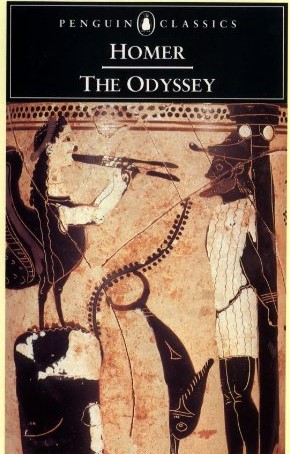Homer and The Odyssey

The oldest surviving stories in the world are The Iliad and The Odyssey, by Homer, probably dating from around 700 BCE. It is arguable that Homer was not really an author in the modern sense, given that his works were composed, and delivered, as oral poems. In presenting the adventures of Odysseus, Homer uses disjointed chronology, in an account full of circumlocution. This is a type of narrative that engages the attention of the reader. In the twentieth century, Homer’s The Odyssey provided a basis for Ulysses by James Joyce, who moved the action from the eastern Mediterranean to Dublin.
I took holidays on the island of Crete, during both 1992 and 1993. In the first of those years, I visited Knossos, the remains of a palace, reputedly the home of King Minos, and location of the legend of the Labyrinth. I also bought an ornate chess set, with metal pieces based on figures from Greek mythology, and a marble board. Having not unpacked the set while away, I found on my return to England that some pieces were duplicated, and others missing. A year later, back in Crete, I successfully exchanged the set, with a surprised shopkeeper. The moral of this tale is, beware the sale of a Greek gift! During the latter holiday I read Homer’s The Odyssey, as an epic tale of ancient Greece.
The Odyssey was the first book to be published in the Penguin Classics series, back in 1946. Penguin Books had been founded in 1935, starting the paperback revolution in Britain. The 1946 volume was a translation of Homer by E V Rieu, which would be revised by his son, D C H Rieu, appearing as a Penguin Classics in 1991. The copy of The Odyssey which I read was the revised version. The Rieu translation is a prose version of Homer’s work, which manages to convey the poetic nature of the original.
More than a decade after reading The Odyssey, I finally got around to The Iliad. The latter book was published as a Penguin Classic in 1950, and reissued in 2003 – again with translations by Rieu father and son respectively. I was rather disappointed, as the original piece felt excessively violent, and lacked the epic scope of its sequel. The Iliad covers the Trojan War, focusing on the period of a few weeks in the ten year conflict, but ranging across other events. There are also flashbacks to the war Homer’s second work, which mostly deals with the disjointed journey home from the war of Odysseus. This treck takes ten years, as various events, directed by the Gods, and adversaries on Earth, hinder his path. Odysseus encounters the Cyclops, Circe, Calypso, troubles at sea, and the song of the Sirens, before he is reunited with Penelope, twenty years after he set out to fight in the Trojan War. I do not suppose all of that is much of a spoiler!? (The !? juxtaposition in chess notation means an interesting move – ?! by contrast means a dubious choice).
The full span of events mentioned in The Odyssey probably cover between sixty and eighty years, from the youth of Laertes, the father of Odysseus, to the death of the latter, a point made by Peter V Jones, in the 1991 Penguin Introduction. Jones provides a fine explanation of the temporal sequence of events expounded by Homer, along with the themes and structure of the work. Amidst the complex sequencing of his stories, Homer provides reassuring rituals, which are repeated across many days, which open as “Dawn appeared, fresh and rosy-fingered”, and close when “the sun went down, and all the ways grew dark”.